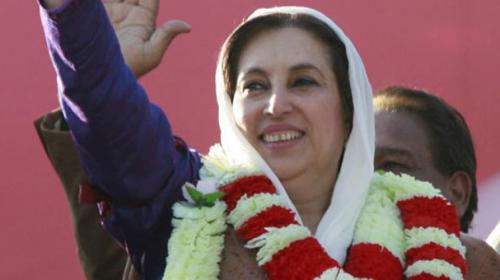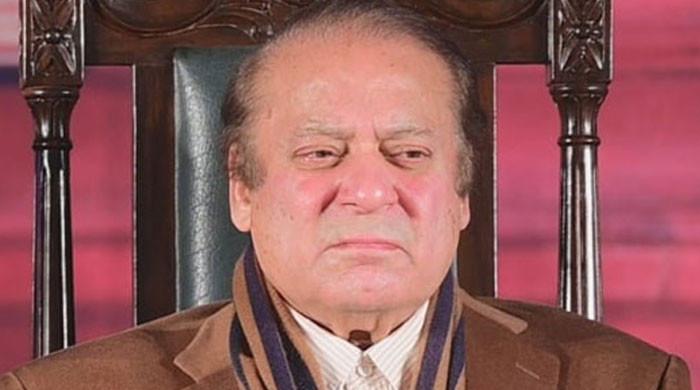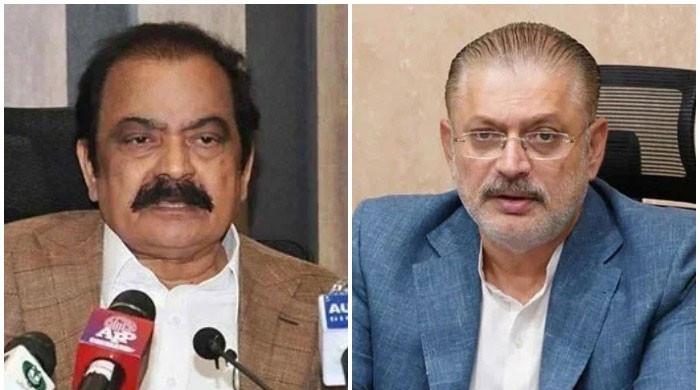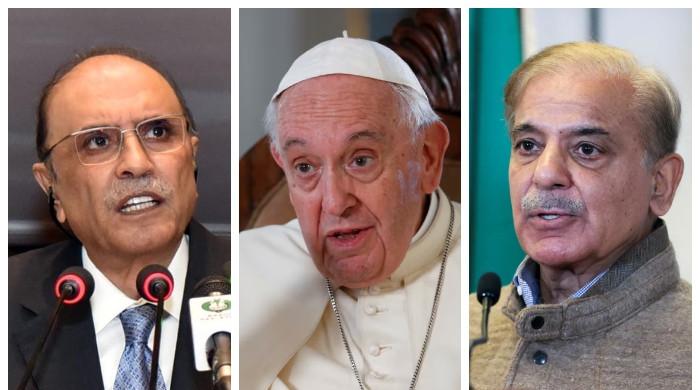Benazir murder: Why did the PPP govt reject the UN commission report?
ISLAMABAD: The mystery of why the Zardari government rejected the UN Investigative Commission's report on the murder of Benazir Bhutto has now been revealed.Documents obtained by ‘The News’ from...
November 17, 2015

Documents obtained by ‘The News’ from sources in Islamabad contain a detailed letter sent to the UN Secretary General Ban Ki-moon by the then foreign minister of the PPP Shah Mahmood Qureshi, rejecting the UN report and Ban Ki-moon’s response. Both reveal Pakistan wanted the UN to continue the investigation for some more time, get testimony of foreign leaders and “third states” and provide details of sources and people whose testimony and information was used by the commission.
The letter specifically says the UN Commission should have interviewed the CIA, BBC and UAE leaders as well as the Afghan government, including Karzai, which it did not.
In a significant statement, Shah Mahmood Qureshi’s letter accuses the UN of blaming the Pakistan Army and ISI of working with the Taliban and rejects this portion of the UN report as unacceptable and not credible based on personal views of the commission members.
The objections raised by Shah Mahmood Qureshi’s letter were however rejected by the UN Secretary General in a letter dated July 9, 2010. A copy of Mr Moon’s letter available with The News categorically stated that he stood by the report of the UN Commission which had done a wonderful job.
The objections Pakistan raised on the UN report included point by point references. Qureshi’s letter stated: “The government of Pakistan is taking necessary steps to investigate the assassination of Mohtarma Benazir Bhutto in a credible manner. However, keeping in view the contents of the report, the following deficiencies are pointed out with relevant observations in this regard, which had impaired the credibility of the report as a fact-finding which could have been relied otherwise for further criminal investigations:
1. The commission has neither mentioned the names of the persons interviewed by it nor made such names as part of the report for use by investigators in Pakistan.
2. The report has not mentioned about documentation and accessibility of such documents prepared on the basis of oral, recorded (audio) or circumstantial evidence examined by the commission.
3. The report has not provided any information about such persons to whom the commission intended to examine or interview but could not do so with reasons of such failure.
4. The report lacks procedural details regarding manner and method of interviewing the persons or witnesses by the members of the Commission i.e. whether it was individually or collectively.
5. There is no indication or mention about persons or any list of such persons who were interviewed outside Pakistan.
6. The report is not providing any information about identification and possession of different records or materials examined by the members of the commission inside or outside Pakistan.
7. It is also not mentioned whether the materials, record of documents or documents prepared on the basis of interviews or evidence of individuals are in possession of the commission and handed over to the UN office for record and preservation for their use in criminal investigation, if needed in future by Pakistani authorities.
In the part II of Mr Qureshi’s letter, it has been pointed out that the Government of Pakistan had some concerns regarding certain portions of the report and observations therein that relate to matters and issues, that in our judgment were not strictly within the framework of the Terms of Reference.
“The Government of Pakistan is quite sure that there was no intention of the commission members to influence foreign policy or Pakistan’s long term strategic interests through such observations or comments. It is the understanding of the Government of Pakistan that even if the members of the commission had dispensed with the said observations, it would not have diminished the usefulness of the said report for our investigations.”
In this regard, the Government of Pakistan is pleased to make the following observations for the record of the office of the UN Secretary General:
1. The report states that it remains the responsibility of the Pakistani authorities to carry out a serious, credible criminal investigation to bring those responsible to justice; a conclusion that the government of Pakistan fully concurs with. However, the above objective is difficult to achieve in view of absence of clarification of certain matters stated by the commission in its report.
Although, substantial questions are raised about the security provided to Mohtarma Benazir Bhutto and the conduct of criminal investigations after the assassination of Mohtarma Benazir Bhutto, but no referential information or supporting material on which such questions are based had been indicated.
Similarly, role of different persons is discussed without any proofs or materials which could have been used for further criminal investigations as desired in the report. Such supporting and relevant material would have assisted in fixing responsibility of persons mentioned therein during different stages of provision of security to Mohtarma Benazir Bhutto or other arrangements which might have saved her life and now necessary to determine their due role or inadvertence in performance of their duties.
2. However, it has been noted with some concern that instead of confining its findings strictly to the determination of “facts and circumstances” of the assassination of Mohtarma Benazir Bhutto, as per the Terms of Reference provided by the United Nations Secretary General in his letter dated 2 February 2009, the members of the Commission of Inquiry have gone on to bring a particular focus on the Pakistan Army (referred to as ‘Establishment’ or ‘military high command’ at various places in the report). Several comments and observations in respect of Establishment are not stated to have been properly verified nor is any material referred to in support of the opinion that the members of the Inquiry arrived at.
3. To illustrate, Part III of the report has given the title “Threats, Responsibilities and possible Culpabilities” and in this chapter members of the commission “assess hypotheses” of culpability of entities. In a Sub-Chapter titled “Threats from Establishment”, the report simply reproduces ‘belief of an unnamed source that “Establishment .... was involved in or bears some responsibility for her assassination”. No evidence has been provided in the report to support this belief. No material mentioned. No document referred to. No affidavit. Such an observation that is unsubstantiated has an adverse effect on other matters that have no relevancy to the mandate of the commission.
It is also noteworthy that in many aspects, the commission’s report is beyond the ambit of Terms of Reference and mandate. In paragraph 216, a superficial judgment is based on such evidence which is not specific and substantial in value accusing the so-called Establishment.
4. It is the sense of the Government of Pakistan that the commission members by accepting requests for anonymity of sources without stating justifiable reasons, have not exercised their discretion in conformity with the purpose of preparing the report that was expected to make a detailed disclosure of sources and material it relied upon. It is a universally recognised practice that in all fact finding or inquiry commissions, the sources and necessary evidence, in all details, are brought on record to substantiate findings which had not been done in this case.
5. Certain observations and discussions in the report have the effect of influencing regional matters which may affect positions that Pakistan had been taking in certain sensitive bilateral relations.
However, the commission had completely ignored the mandate given to it according to paragraph 3 of the Terms of Reference which required the commission to approach the Third States with a request for cooperation in the collection of material or information relevant to the case and provision of expert personnel.
The commission had relied upon and tried to establish linkages between some organisations operating internationally or some international sources belonging to Third States like BBC, al-Qaeda groups or Afghan Taliban belonging to neighbouring country i.e. Afghanistan, authorities of the United Arab Emirates, CIA of America as mentioned in paragraphs 201, 202, 203, 205, 206, 207, 209, 211 and 219 of the report.
All these sources are apparently looking relevant and as the commission had also relied upon information disseminated from these sources but the commission had not exercised the power available to it under paragraph 3 of the Terms of Reference. There was a need that some authorities concerned of such Third States should have been interviewed.
This was more so since letters were written to persons residing in various parts of the world by the Government of Pakistan and information of which was provided to the commission. The commission should have made greater efforts to insist on such Third States to provide such access for interviews and to their archives or authorities concerned for acquiring direct evidence instead of newspaper or other reports having doubtful evidentiary value.
There is a possibility that thorough questioning of international sources might have proved useful in unearthing any international link to Mohtarma Benazir Bhutto’s assassination. Individuals located outside Pakistan who have some relevance with the incident and are also equally important to provide some lead to actual perpetrators and executors of the plan should have been contacted by the commission itself for interviewing by making greater efforts to do substantial justice. In this connection, it is relevant to mention that the Government of Afghanistan conveyed to the Government of Pakistan that Hamid Karzai, President of Afghanistan, was willing to meet the members of the commission in Kabul on any day before the 25 April, 2010, which fact was brought to the notice of the commission. However, the commission neither met him nor has given any reason for not meeting him in its report.
It has been a general observation and assessment of the people of Pakistan that the plot to assassinate a leader of international stature and fame was not possible without planning, executing and financing from international sources in addition to their executors at local or national level with their possible channels of communication and transfer of funds. Keeping this view in mind, the commission was empowered to approach Third States. Even the commission mentioned this aspect but thereafter ignored to provide any further information in this respect. It is a flaw in this fact finding report of the commission. This is especially in terms of the provision of finance, method and type of communications and provision of the necessary logistics which were needed to carry out the assassination.
6. The Government of Pakistan also expresses its concern that unsubstantiated observations and comments on the Pakistan Army in particular, have the consequence of affecting the credibility and standing of Pakistan Armed Forces and thereby adversely affect the morale of its officers and Jawans at the time when they are laying down their lives and fighting against those who have waged war not only against Pakistan but also threatened peace of the world. The decisive role of Pakistan Army in reducing the global threat relating to terrorism is being appreciated by all the states and their leaders.
7. The Government of Pakistan also expresses its reservations on certain observations in the report that imply a nexus between the Taliban and the Pakistan Army. It is clear from the Terms of Reference that such an assessment was not within the scope of the work given to the commission. The Government of Pakistan submits that such formulations undermine the method, manner and commitment of actions undertaken by the Pakistan Army against the terrorists on its soil that are being welcomed domestically and have also won wide appreciation and support from the international community as well.
8. Likewise, the excessive discussion on the alleged role of ISI and intelligence agencies is carried out at various places in the report but the same is not supported by any reference or evidence. The report fails to identify the material, documents and specific interviews on which it relies to come to the conclusions regarding the role of ISI. In any case, observations and comments on the history of ISI, its purpose, its past and present role and area of work are extraneous to the purpose of the mandate that the Commission of Inquiry was given. Therefore, the Government of Pakistan feels that the said observations have little relevance to the Terms of Reference given to the commission.
9. The Government of Pakistan also considers that while making ‘assessment’ of various hypothesis, the Commission of Inquiry has not exercised its discretion reasonably as it has devoted disproportionate space to hypothesis relating to Pakistan Army and Establishment and intelligence agencies, while neglecting to make exhaustive discussions on other hypothesis.
10. The Government of Pakistan has also some concerns in respect of the report making observations and findings that absolve or hold persons or entities responsible, whereas in the letter from the Secretary General dated 2 February 2009, it was explicitly mentioned that its mandate shall not be to carry out criminal investigation.
In part III of Shah Mahmood’s letter, it has been stated that comments and observations about the Pakistan Army, ISI or the so-called Establishment, are only the opinions of the members of the commission. They do not represent authenticated determinations based on any fact or evidence and the same shall neither form a precedent nor a basis to lend credence to a political position in this regard, in the practice of states and/or that of international organisations.
2. The Government of Pakistan maintains that any comments, observations or findings given in the report in respect of all matters except those that are directly relevant to the facts and circumstances of the assassination of Mohtarma Benazir Bhutto, shall not be viewed as having determined any fact that relates to any matter of foreign policy of Pakistan neither shall it have the effect of influencing any position that the Government of Pakistan has been adhering hitherto.
3. The report has a serious flaw because the commission has failed to approach the Third States or to provide some reliable information to unearth, if any, international linkages perpetrating, planning, financing or abetting in assassination of Mohtarma Benazir Bhutto although there is mention and reliance on such sources belonging to Third States. No doubt there were hiccups but the commission should have taken more time and effort in this regard but unfortunately it appears that it paid scant attention to this aspect and instead has tended to focus on internal matters. The international linkages were an important aspect of mandate of the commission under paragraph 3 of the Terms of Reference which remained unfulfilled. This is notwithstanding the fact that due to its UN backing, the commission was in a far better position to carry out this inter-state inquiry due to its global or international mandate rather than a domestic inquiry team.
4. Further, the Government of Pakistan wishes to present clear understanding to the office of the Secretary General that the comments and observations so made by the members of the Inquiry Commission in the report, which are not authenticated and referenced, shall not be used or adopted by any state or institution as ‘facts determined ‘ and in the event that any state or institution makes an attempt to rely on them, then the said reliance shall not hold any credence, whatsoever.—Originally published in The News











